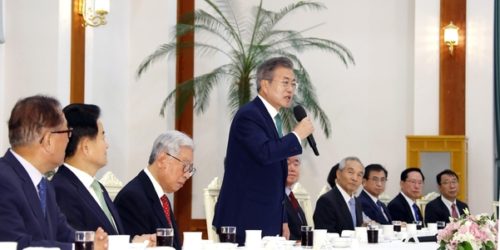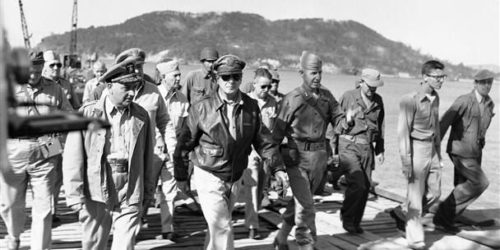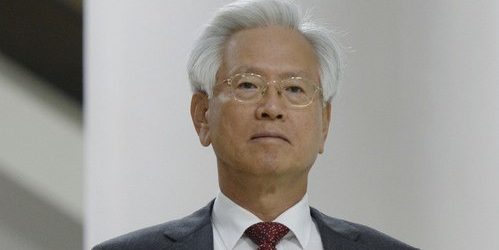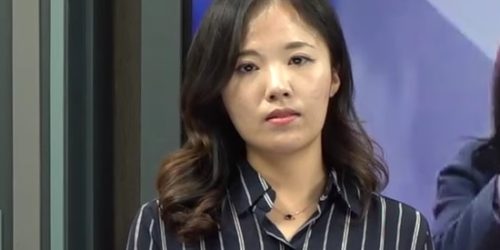March For My Beloved or Soviet Tanks?
2018-10-17, Tara O
“Shall we sing the For My Beloved March (임을 위한 행진곡, Im-eul Wihan Hangjingok)?” proposed presidential candidate Moon Jae-in to those around him while he was visiting the “5.18” Cemetery on April 6, 2017. The Gwangju incident of 1980 that began on May 18 is often referred to as “5.18” in Korea. The incident was initially seen as an armed riot after political figure Kim Dae-jung was jailed. (7:42) Many years later, during the Kim Young-sam administration, the 5.18 Special Law was introduced, which led to two specific actions. (10:05) The first was the reinvestigation of the Gwangju incident, and the second was the creation of a “person of merit” list, which provided a significant lump sum monetary compensation and a generous life-time pension and benefits, such as preferential entry to universities and free utilities. The “person of merit” list continues to grow to this day, and the criteria, the members, and the process are opaque, despite public demands for transparency. In the late 1980s and by the 1990s, the Gwangju incident was rebranded as a “democracy” movement, and some of the participants have been idolized. Since then, the 5.18 incident can only be praised, not criticized or challenged. (11:00)
After they all completed singing, the resolute-faced Candidate Moon said “We certainly must make it into a commemorative song at the 5.18 anniversary” and later wrote “A true democratic republic that inherits Gwangju spirit in its constitution” in the guest log. In fact, Moon did try to add “Gwangju Revolution Spirit” to the South Korean constitution in early 2018. Moon told his supporters “From now is the real start. Let’s conclude again a forceful power change based on our overwhelming strength in the race.” After singing the For My Beloved March with his supporters with their collective fists raised in the air at another campaign gathering on April 18, candidate Moon Jae-in stated “I will not forgive any talk or any acts that insult the 5.18 democracy struggle; I’ll designate it by rule as ‘the enemy of democracy’ and prohibit it by law.” (1:41)
After a successful candidacy, Moon was sworn in as the president of South Korea on May 10, 2017. On May 12, 2017, two days after taking office, and the same day when he directed the discarding of the school textbooks proposed under the Park Geun-hye administration, Moon also directed jechang (제창) or the singing together of the For My Beloved March at the 5.18 ceremony, which was carried out by over 10,000 attendees on the 37th anniversary of 5.18.
Jechang means not only singing together, but singing something that they commonly identify with, something that gives them a common purpose. It could involve motions. In this case, holding hands and swinging their arms together.
The attendees included not only the 5.18 associated organizations, but also other “revolution” related organizations as well as the families of the deceased during the Sewol Ferry sinking. The event was more than three times as large as the event from the previous year.
There are differing views of these incidents. Some, including the Moon administration, call them democratization movements while others refer to them as opposing the very foundation and system of the Republic of Korea (ROK)–liberal democracy and market economy. According to a university student organization Truth Forum, “the democratic movement of the 1980s in South Korea should not be praised uncritically, because the movement at its core had North Korea’s Kim Il Sung’s Juche ideology followers, who sought to subvert the liberal democratic system and market economy of the Republic of Korea.” (9:00)
The day before the 37th anniversary of the 5.18 event, Moon named Ms. Pi Woo-jin (피우진) as the new Minister of Patriots’ and Veterans’ Affairs. Pi Woo-jin replaced Park Sung-choon (박승춘), the former minister who had blocked jechang (but not hapchang–singing together in harmony)of the For My Beloved March, questioning who does “Im” (Beloved) refer to.
After Ms. Pi became the minister, she formally reported her predecessor Park to the police in four separate cases to investigate him for “dereliction of duties.” (4:10) Hwang is considered the top among numerous political targets of the Moon administration’s jeokpae cheongsan (elimination of deep-rooted evil or accumulated ills) campaign, which amounts to suppression of the political opposition. Although the court found him not guilty of all charges, Pi has established a “Committee for the Prevention of Recurrence of Illegal and Unfair Acts of the National Veterans & Patriots Affairs Ministry” consisting of outside civilians, and based on that, the police began investigating Park again. Pi also has stated she will push for legislation that will designate the For My Beloved March as a memorial song for 5.18.
The For My Beloved March is considered the anthem of left activists, who view the march as the symbolic song of “democratization” and the “5.18 spirit,” and at times, they prefer to sing the march over the National Anthem. The right views the march as a “revolutionary” song that undermines Korea’s constitutional values and national identity, and opposes designating it as a national memorial song. The “new day” in the lyrics refer to “a world in which anti-capitalism and anti-U.S. is realized through the people’s revolution,” according to a coalition of 68 veterans’ and conservative organizations.
This song was also sung at Kim Il Sung University to welcome South Korea’s Jeondaehyub (National Council of Student Representatives) student. Jeondaehyub students worshipped Kim Il-sung and wanted to achieve socialism/communism in South Korea and unify Korea under North Korea; they saw the U.S. as an impediment and called for U.S. troops to leave South Korea. For more information on Jeondaehyub, see here.
According to the Gwangju City website, the For My Beloved March was composed for the post-mortem “soul wedding” ceremony of Mr. Yoon Sang Won (윤상원) (died in 1980-5-27) and Ms. Park Ki-soon (박기순) (died in 1978).
Mr. Yoon Sang-won became an uijang chui-up-ja (위장 취업자)–college students or those with college education who enter firms disguised as laborers to incite unrest. They would not reveal the fact that they have college education on their applications. Once they are hired as employees, they teach laborers about labor activism methods as well as organize protests. (Woo, 101-107) Ms. Park Ki-soon was already an ujiang chui-up-ja at the company Yoon entered. Although they knew each other, there does not seem to be any evidence that they were romantically involved or wanted such a ceremony.
Yoon Sang-won is also known as Yoon Gae-won (윤개원). He was in the splinter group in Gwangju that wanted to fight the government until the end, rather than turn in the weapons for the government acceding to some of their demands. (Ji, 446) The march is said to commemorate his armed fighting spirit. The Gwangju City website refers to Yoon as a “patriotic martyr” (열사), and he is buried at the Gwangju 5.18 National Cemetery (designated as such by the 5.18 Special Law). The 2007 movie “Colorful Vacation” (화려한 휴가) and the majority of over 50,000 pieces of writing about him on the internet claim he was shot in the chest. (Ji, 470) A witness statement from a bookstore clerk in the official investigative report, however, states Yoon died from a wound from a sharp knife-like object (Ji, 470).
Ms. Park Ki-soon, the other member of the “soul wedding” in the march was the sister of Park Hyoung-sun, who, during the 5.18 incident was involved in an police armory attack and arms stealing (a large cache of weapons and explosives were stolen from 44 armories). Park Hyoung-sun was also incidentally the major shareholder of the Busan Savings Bank (부산저축은행), who was later imprisoned for 10 months for making hundreds of millions of illegal loans from his bank. President Moon Jae-in, who was former president Rho Moo-hyun’s Chief of Staff at the time in 2003, made a personal call to the Financial Supervisory Service officer in charge of the investigation of Busan Savings Bank. After receiving a relatively light punishment, the Busan Savings Bank transferred $5.2 million (5,900,000,000 Won) to the law firm that Moon Jae-in co-owned.
The Gwangju City website states that the For My Beloved March was created in 1982, and is based on the original work (a poem) of Baik Gi-wan (백기완), with Kim Jong-ryul (김종률) composing the music and Hwang Seok-yong (황석영) and Kim Jong-ryul (김종률) writing the lyrics. 1982 is one of the many dates claimed for its creation.
Contrary to the statement on the Gwangju website, Hwang Seok-yong, who was involved in making the song, said the direct motive for the song was not the spiritual wedding ceremony of Yoon Sang-won and Park Ki-soon, but a part of “Liberty Gwangju” broadcasting activities developed by Hwang in 1983.
Yet another claimed the date of its creation is 1991 and with a different purpose. According to the Ministry of Veterans and Patriots, the For My Beloved March was jointly created in 1991 by Hwang Seok-yong and a North Korean composer Ri Chun-gu (리춘구) in North Korea, and this is further detailed below.
Born in 1932 in Hwanghae Province (currently in North Korea), Baik Gi-wan was a unification, labor, and political activist as well as a writer. In 1979, he participated in a demonstration disguised as a wedding at YWCA, calling for a direct presidential election and was jailed. It was during this time he wrote the poem Muitbinari (묏비나리). This dark poem has the message of laborers and the masses crushing this “rotten world” of the U.S. (“big nosed ones”) and the “haves.” According to the Chosun newspaper, the For My Beloved March lyrics are based on Baik Gi-wan’s poem, from which Hwang Seok-yong took “Without leaving behind love, honor, nor name” and “I’m going forward from the front, so living people, follow me” verses. Baik was freed in March 1981 in a general amnesty. He ran for president in 1987 and 1992.
Kim Jong-ryul is given the credit for composing the music and writing the march. Kim later worked as the Secretary General of the Gwangju Cultural Foundation, where he worked with the Gwangju Southern District Council to unanimously pass a resolution designating the For My Beloved March as the memorial song for 5.18. He said he does not understand why this song is viewed as “pro-North Korea,” but there are reasons.
Hwang Seok-yong, one of the writers of the lyrics for the For My Beloved March, was invited by Kim Il-sung, and made five trips to North Korea, met with Kim Il-sung seven times, and received $250,000 from North Korea as an operational fund for illicit activities in South Korea. For his activities, Hwang was sentenced to 7 years in jail for violating the National Security Law. Kim Il Sung asked Hwang Seok-yong to make a 5.18 musical A Symphonic Poem for My Beloved. Hwang went to North Korea in March 1989 (16:10) and collaborated with a North Korean writer for three years. During that time, For My Beloved March was created to become the musical’s background music. In North Korea at that time, the term “Im” (beloved) was reserved only for Kim Il-sung. (16:17)
Hwang Seok-yong also wrote about 5.18 in his book Beyond Death, Beyond the Darkness of Time (Jooggeumeul Neommeo, Shideui Eodeumeul Neommeo), emphasizing it as Gwangju citizens rising up to advance democracy. As such, Hwang played a crucial role in instilling the idea that 5.18 is a democracy movement. (23:05) It is his version that has dominated the Korean psyche and education system.
In essence, the song is controversial, and emotions run high on both sides. Numerous details, such as exactly who created the For My Beloved March, and when and for whom it was created, are unclear or conflicting.
Here are the lyrics.
Without leaving behind love, honor, and name
Our vows to go forward for a lifetime
My comrade is nowhere to be found and only the flag flies
Be resolved until a new day
As time goes by, the mountains and streams know
An ardent shout crying out after waking up
I’m going forward from the front, so living people, follow me
I’m going forward from the front, so living people, follow me
What are Marches (marching songs)?
A march is a genre of music with a strong regular rhythm. It originally was expressly written for marching the military, as moving large numbers of troops quickly requires them to step with the same cadence. Examples are the Turkish March by Mozart, the Spanish March by Strauss and Marches Militaires by Schubert. At 120 beats per minute, a march matches soldiers’ walking paces. For funeral marches, the beat slows down to 60 beats per minute, but still matches the soldier’s pace of 120 steps per minute.
Other countries also has marches. The Three Tanks March is a Soviet march dedicated to the Soviet tanks of the World War II era and the tankers who operated them. The video with music and pictures of the tanks can be found here. The video highlights the Soviet T-34 tank.
To hear the For My Beloved March, click here for the video. (58:55)
What is interesting is that the “For My Beloved March” sounds quite similar to a slowed down version of the Three Tank March. Some may even say it is the same. To get a sense of just how similar the songs are, listen to the Three Tank March at 75% speed. This is roughly the same speed that the For My Beloved March is played in the preceding video. [To slow down the video, click the Settings button (the gear icon), then select “speed” from the menu, and change the speed from normal to .75].
It is both troubling and ironic that the For My Beloved March that the Moon administration, his party, and certain civic groups want to promote so ardently and codify into the law sounds eerily like a tank march that praises the very Soviet tank, the T-34, that was provided to North Korea to invade South Korea in 1950 during the Korean War. It is also ironic, and even hypocritical, that the groups, which have been against “foreign” influence, promote a song that is heavily borrowed or perhaps copied from a foreign, anti-democratic source as a symbol of democracy in South Korea…that is, unless they really mean “people’s democracy.”





